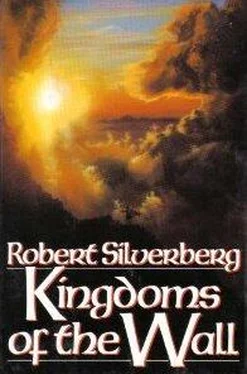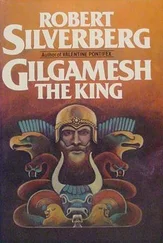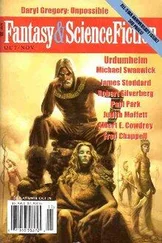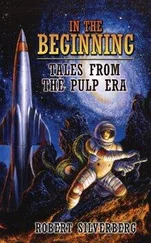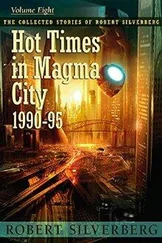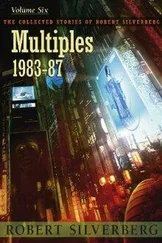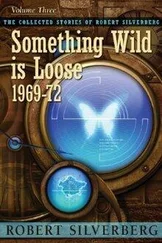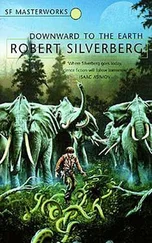Kingdoms of the Wall
by Robert Silverberg
And yet all the time, below the fear and the irritation, one was aware of a curious lightness and freedom … one was happy all the same; one had crossed the boundary into country really strange; surely one had gone deep this time.
—GRAHAM GREENE
Journey without Maps
This is the book of Poilar Crookleg, I who have been to the roof of the World at the top of the Wall and have felt the terrible fire of revelation there. I have seen the strange and bewildering gods that dwell there, I have grappled with them and returned rich with the knowledge of the mysteries of life and of death. These are the things I experienced, this is what I learned, this is what I must teach you for the sake of your souls. Listen and remember.
If you are of my village, then you know who I am. But I want the story I am about to relate to be heard and understood far beyond our own village, and so I will tell you that my father was Gabrian son of Drok, my House is the House of the Wall, and my clan within that House is Wallclan. So I come from a noble line.
I never knew my father when I was growing up, because he set forth on the Pilgrimage when I was only a small boy and never returned. So there was only a hole in my spirit where others have fathers to guide them. All that he left me with to carry me through childhood and boyhood was the memory of a tall man with bright eyes and strong arms, sweeping me up and tossing me high overhead and laughing in a deep, rich voice as he caught me. It may not be a trustworthy memory. It may have been some other man entirely who lifted me and tossed me like that; or maybe it never happened at all. But for many years that was all I had of my father: bright eyes, strong arms, a ringing peal of laughter.
My father’s father had gone to the Wall also in his time. That is the tradition of my family. We are folk of restless soul, Pilgrims by nature. We always have been. The Pilgrimage is the high custom of our people, of course, the great defining event of one’s life: either you become a Pilgrim or you do not, and either way it leaves its mark upon you forever. And we are of the Pilgrim sort. We claim descent from the First Climber; we take it for granted that we will be Pilgrims ourselves when we come of age, and will go up into the fearsome heights where one’s body and one’s soul are placed at dread risk of transformation by the forces that dwell there.
Like my father, my father’s father failed to return from his god-quest in the realms above.
As for me, I never gave the Pilgrimage a thought when I was young. I looked upon the Pilgrimage then as some thing that concerned older folk, people in the second half of their second ten of years. It was always certain to me that when my time came I would be a candidate for the Pilgrimage, that I would be chosen, that I would undertake it successfully. Taking the Pilgrimage for granted in that way allowed me not to think about it at all. That way I was able to make it unreal.
I suppose I could pretend to you that I was a child of destiny, marked from my earliest years for supreme achievement, and that holy lightnings crackled about my brow and people made sacred signs when they passed me in the street. But in fact I was an ordinary sort of boy, except for my crooked leg. No lightnings crackled about me. No gleam of sanctity blazed on my face. Something like that came later, yes, much later, after I had had my star-dream; but when I was young I was no one unusual, a boy among boys. When I was growing up I wasn’t at all the sort to go about thinking heavy thoughts about the Pilgrimage, or the Wall and its Kingdoms, or the gods who lived at its Summit, or any other such profundities. Traiben, my dearest friend, was the one who was haunted by high questions of ultimate destinies and utmost purposes, of ends and means, of essences and appearances, not I. It was Traiben, Traiben the Wise, Traiben the Thinker, who thought deeply about such things and eventually led me to think about them too.
But until that time came, the only things that mattered to me were the usual things of boyhood, hunting and swimming and running and fighting and laughing and girls. I was good at all those things except running, because of my crooked leg, which no shapechanging has ever been able to heal. But I was strong and healthy otherwise, and I never permitted the leg to interfere with my life in any way whatever. I have always lived as though both my legs were as straight and swift as yours. When you have a flaw of the body such as I have, there is no other course, not without giving way to feelings of sorrow for yourself, and such feelings poison the soul. So if there was a race, I ran in it. If my playmates went clambering across the rooftops, I clambered right along with them. Whenever someone mocked me for my limp—and there were plenty who did, shouting “Crookleg! Crookleg!” at me as though it were a fine joke—I would beat him until his face was bloody, no matter how big or strong he might be. In time, to show my defiance of their foolish scorn, I came to take Crookleg as my surname, like a badge of honor worn with pride.
If this world were a well-ordered place, it would have been Traiben who had had the crooked leg and not me.
Perhaps I ought not to say so cruel a thing about one whom I claim to love. But what I mean is that in this world there are thinkers and doers; doers must have agility and strength of body, and thinkers need agility and strength of mind. I had agility and bodily strength aplenty, but my leg was a handicap all the same. As for Traiben, the thinker, there was no strength in his frail body anyway, so why shouldn’t the gods have given him this limp of mine as well, instead of me? One more physical drawback, among so many, would not have made his life any worse, and I would have been better fitted to be the person I was meant to be. But the gods are never so precise in parceling out our gifts.
We were an odd pair: he so small and flimsy and fragile, with no more strength to him than a gossamer, and me so sturdy and unwearying. Traiben looked as though you could break him with a blow, and you could. Whereas I have made it clear throughout all my days that if there is any breaking to be done, I will be the breaker rather than the broken. What drew us together, then? Though we belonged to the same House and the same clan within that House, that in itself would not necessarily have led to friendship between us. No, I think the thing that linked us so tightly, different though we were in so many respects, was the fact that each of us had something about him that set him apart from the others of our clan. In my case it was my leg. In Traiben’s, it was his mind, which burned with such fierce brilliance that it was like a sun within his skull.
Traiben it was who first set me on the path that leads to the summit of the Wall, when he and I were twelve years old.
* * *
The name of my village is Jespodar, which the Scribes and Scholars say is a word in the old Gotarza language that once was spoken here, meaning, “Those Who Cling to the Wall.” I suppose we do. Our village, which is really not a village at all but a vast conglomeration of villages all tangled together, containing many thousands of people, is said to lie closer to the perimeter of the Wall than any other—right up against its flank, as a matter of fact. It is possible to take a road that runs out of the center of Jespodar that will put you on the Wall itself. If you were to make the great journey around the base of the Wall, you would come to scores of other villages—hundreds, maybe—along its perimeter; but none, so the Scholars tell us, actually abuts the flank of the Wall the way Jespodar does. Or so we are taught in Jespodar, at any rate.
Читать дальше
